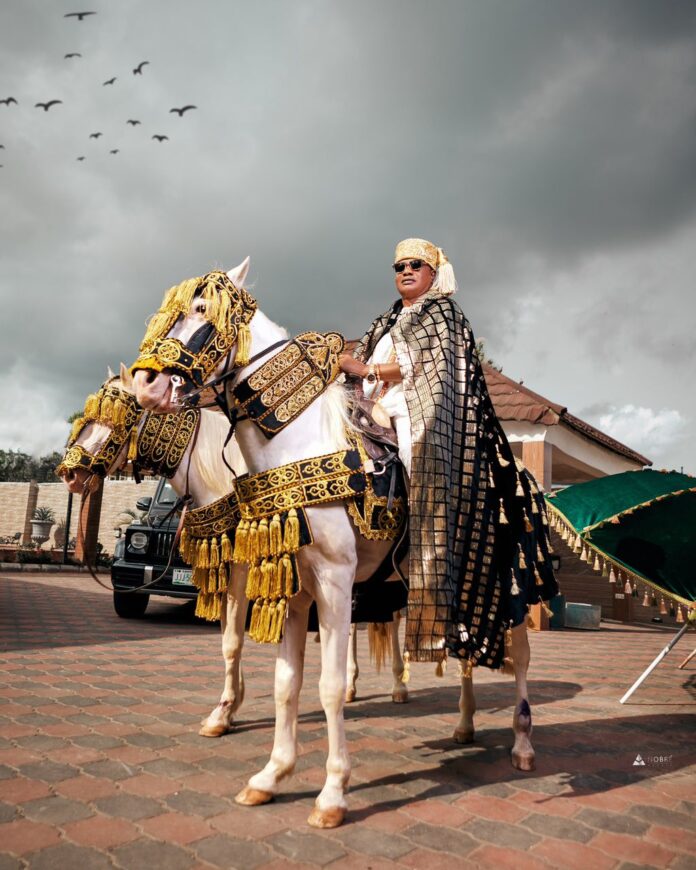You know, I’m still buzzing from Ojude Oba Festival 2025. Seriously, it wasn’t just an event; it was a phenomenon, a living tapestry woven with threads of deep tradition and vibrant contemporary flair. And if you’re like me, still scrolling through feeds, zooming in on those jaw-dropping gele styles and majestic horse adornments, you’re probably kicking yourself for not being there. Trust me, the FOMO is real, and it’s justified.
From the moment the first rhythmic drumbeat vibrated through Ijebu-Ode, you knew this wasn’t just another celebration. This was the soul of a people, laid bare in all its glory. Dazzling fashion that made you gasp, horse parades that seemed to defy gravity, cultural displays that stirred something primal within you, and an energy from the crowd that was utterly infectious – Ojude Oba 2025 was a masterpiece, a symphony of heritage and modern-day glam that will resonate for years to come. If your weekend didn’t involve being swept up in this magic, you truly missed a spectacle.
Let’s unpack why this festival isn’t just a fleeting moment but a powerful, enduring statement.
The Legacy: More Than Just a Festival – A Century of Soul
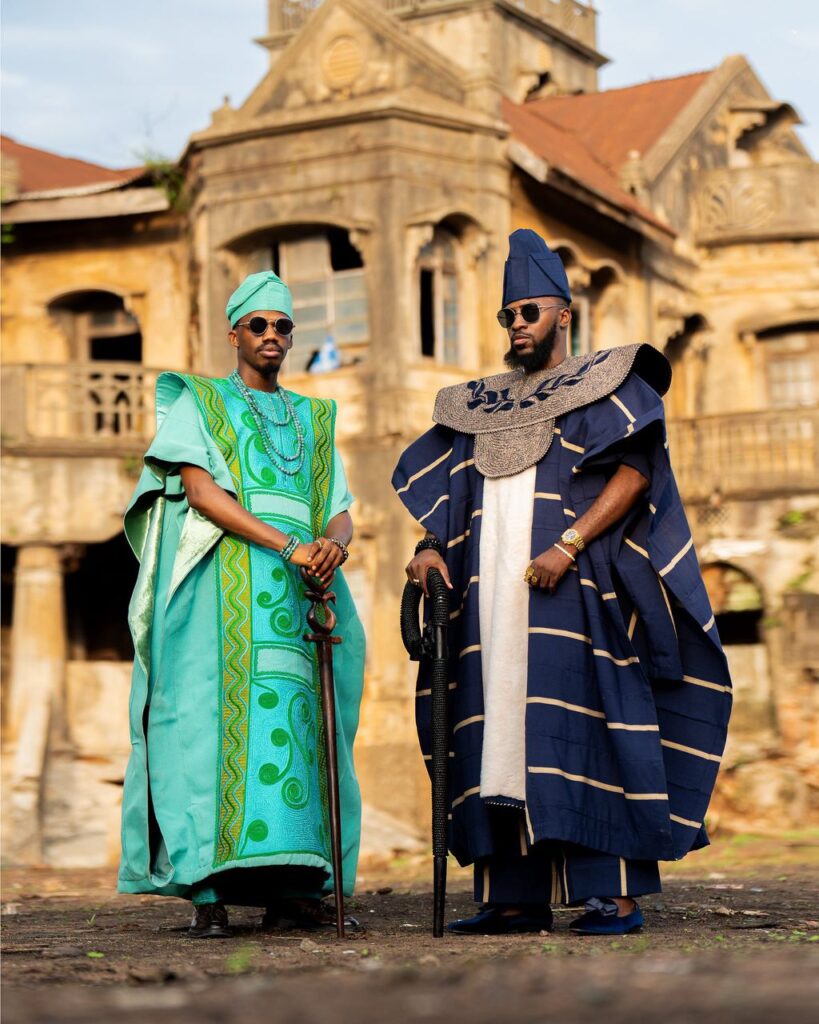
First off, let’s be clear: Ojude Oba isn’t some fleeting trend manufactured for clicks. This isn’t a random community gathering. This is a tradition that has gracefully matured over more than a century, deeply embedded in the very DNA of Ijebu identity and the broader Yoruba heritage. It’s a testament to resilience, continuity, and an unwavering pride in one’s roots.
Its humble beginnings are steeped in profound respect. It started as a sacred post-Eid al-Kabir gathering, where the Muslim faithful of Ijebu-Ode would traditionally assemble, two days after the sacrifice, to pay homage to their sovereign, the revered Awujale of Ijebuland. This annual act of fealty and gratitude blossomed organically. Over time, it transcended its initial religious confines, embracing all sons and daughters of Ijebuland, regardless of creed, and gradually drawing in admirers from across Nigeria and the global diaspora.
Today, it’s not just a celebration; it’s a living, breathing statement of cultural pride, a declaration of community, and a powerful conduit through which the rich history of the Ijebu people is passed down, vibrant and untainted, through generations. It’s a story told not just in words but in dance, in fabric, in communal joy, and in the thundering hooves of adorned horses.
The Crowd, The Color, The Culture: An Electric Tapestry
Now, let’s talk about the palpable energy that defines Ijebu-Ode during Ojude Oba. It’s truly electric. Imagine the entire town pulsating with an almost tangible joy, a collective effervescence that transforms every street into a potential stage. People don’t just arrive to observe; they arrive to participate, to immerse themselves, to become a part of the grand spectacle.
We’re talking about an incredible convergence of thousands: traditional rulers steeped in ancient wisdom, high-ranking dignitaries, beloved celebrities, curious tourists, proud locals, influential politicians, and fervent culture lovers. All united, all drawn by the magnetic pull of this grand celebration of Ijebu excellence. The air is thick with anticipation, the buzz of countless conversations, the aroma of festive foods, and the distant, rhythmic throb of drums.
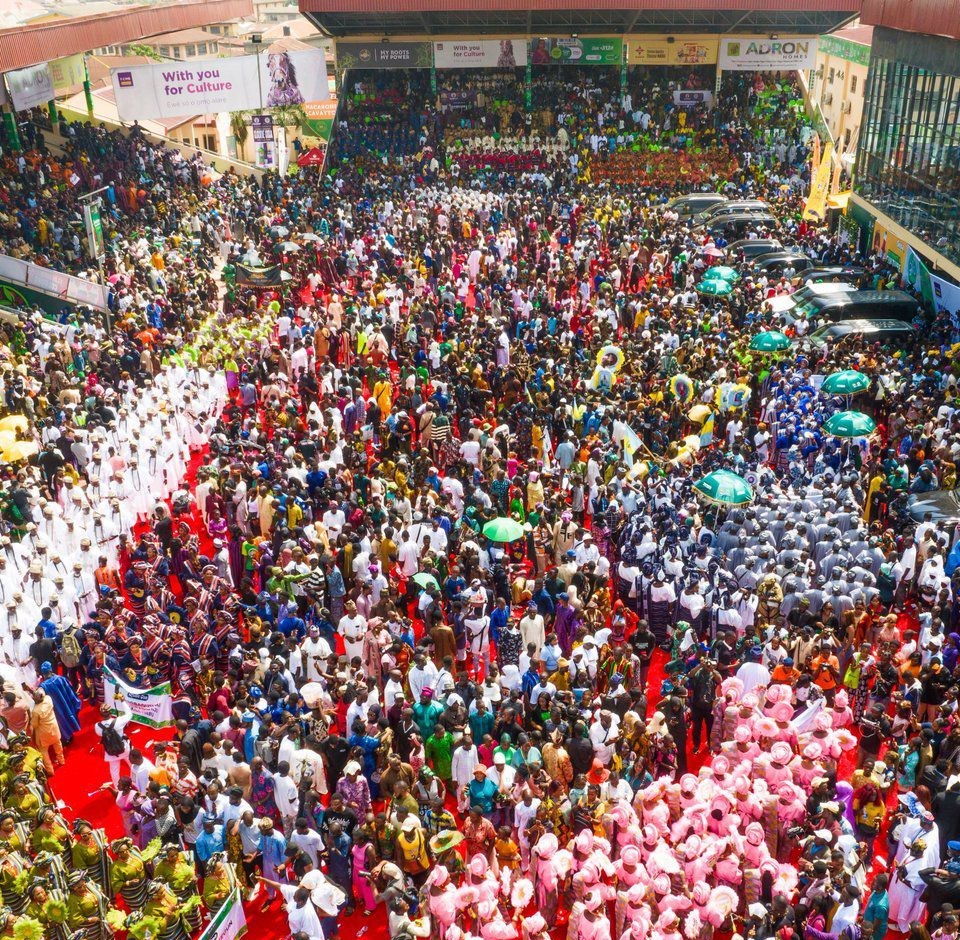
It’s more than just a crowd; it’s a living mural of culture, a kaleidoscope of color, and a vibrant affirmation of identity. Walking through it, you’re not just an observer; you’re part of something ancient and powerful, a human tide flowing with joy and reverence. Every smile exchanged, every spontaneous burst of dance, every communal cheer adds to the collective heartbeat of the festival.
Regberegbe: The Soul-Stirring Heartbeat of the Festival
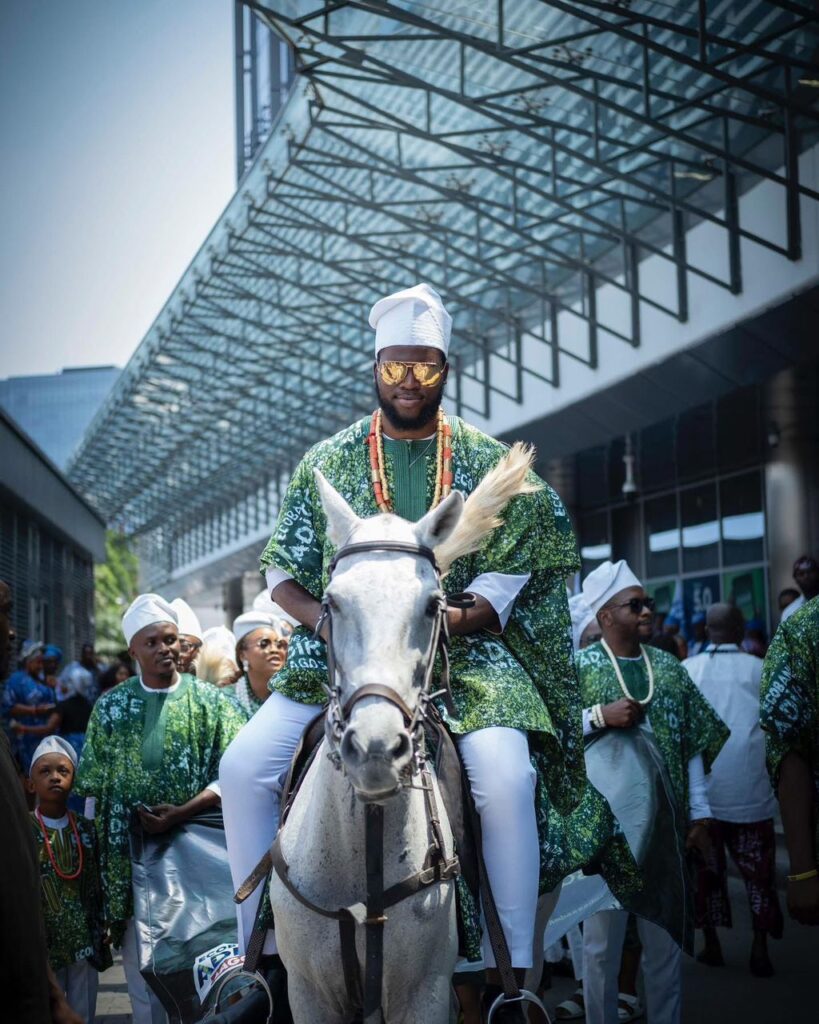
You simply cannot articulate the essence of Ojude Oba without delving into the Regberegbe – the traditional age-grade groups that form the very soul of the Ijebu community. And let me tell you, this year, they didn’t just participate; they stole the show, commanding every gaze, every gasp.
Each Regberegbe group made an entrance fit for royalty. Picture this: perfectly matched outfits, meticulously tailored from the finest fabrics, looking as if they’d just stepped off a high-fashion runway. Think of the intricate details – the embroidery, the beadwork, the precision of their coordinated accessories. Then, add the horses, not just beasts of burden but magnificent creatures that seemed to sparkle under the sun, adorned with gold embellishments, vibrant plumes, and custom-designed fabrics that rivaled the human attire. And their dances? They were more than mere steps; they were narratives, movements filled with such raw emotion and historical significance that you could literally feel the rhythm deep in your chest, connecting you to generations past.
But this isn’t just a performance for the cameras. Every grand entrance, every synchronized dance, every deferential salute to the Awujale is imbued with profound respect, unshakeable pride, and a deep sense of belonging. The Regberegbe are the custodians of communal responsibilities, often undertaking development projects within the community throughout the year. Their festival appearance is the apex of their annual service and a public declaration of their identity. This is how you honor your roots – with passion, precision, and an unwavering commitment to your community.
Fashion That Turned Heads. And Then Some.
Oh, if you possess even an ounce of appreciation for fashion, Ojude Oba is not just a runway; it’s a grand opera of style, a sartorial feast for the eyes. From the very instant the first Regberegbe group stepped into the arena, it was blindingly clear: here, style is not just an accessory; it’s a powerful statement, and tradition is the meticulously crafted blueprint.
The women, oh, the women! They draped themselves in lace so rich, so intricately designed, that it could easily finance a small nation. This wasn’t just fabric; it was artistry. Each outfit was complemented by meticulously tied geles, architectural headpieces that defied gravity and celebrated artistry. Jewelry, from statement necklaces to delicate bangles, sparkled under the sun, catching every ray. And their makeup? Flawless, even in the bustling heat, a testament to skill and preparation.
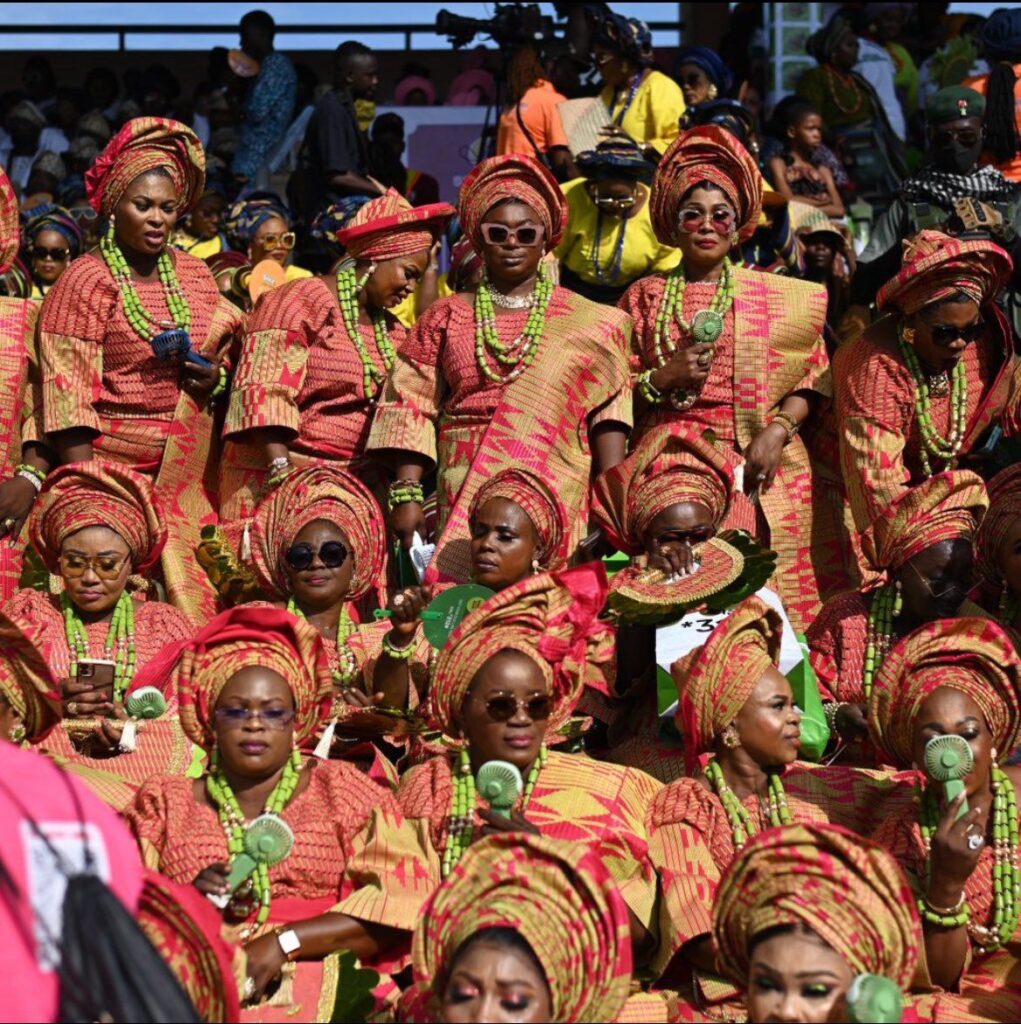
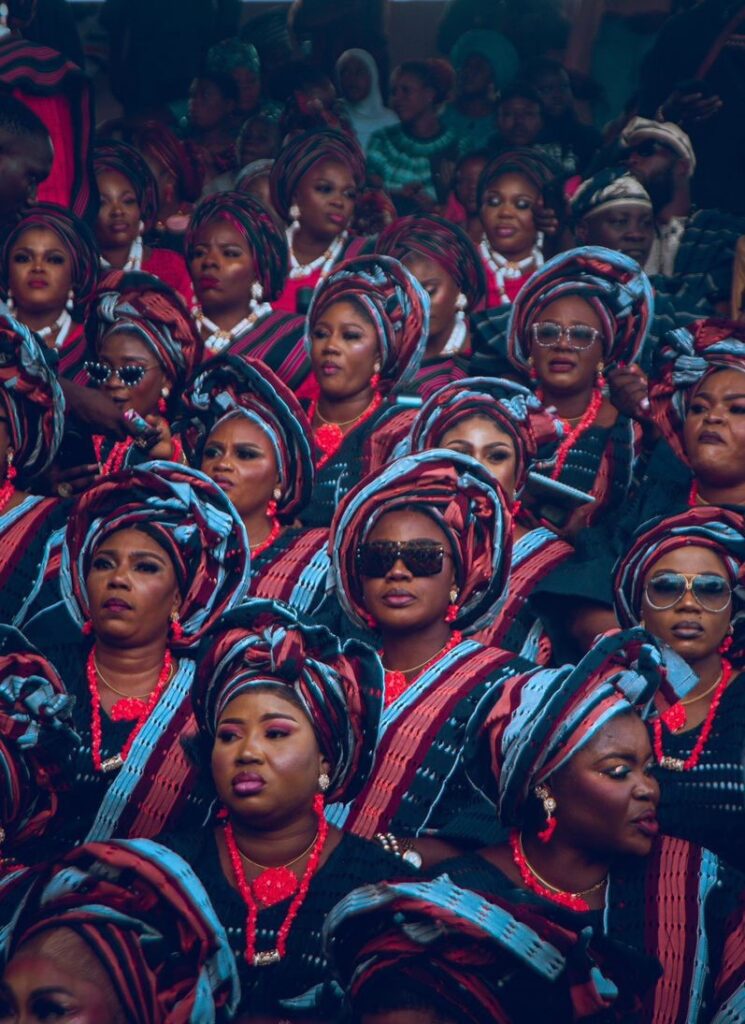
The men, equally resplendent, arrived in flowing agbadas. These weren’t just garments; they were canvases of cultural expression, perfectly embroidered with intricate patterns, color-coordinated to perfection, paired with polished leather loafers and bold, often designer, sunglasses. They truly embodied the essence of cultural kings on full, unadulterated display.
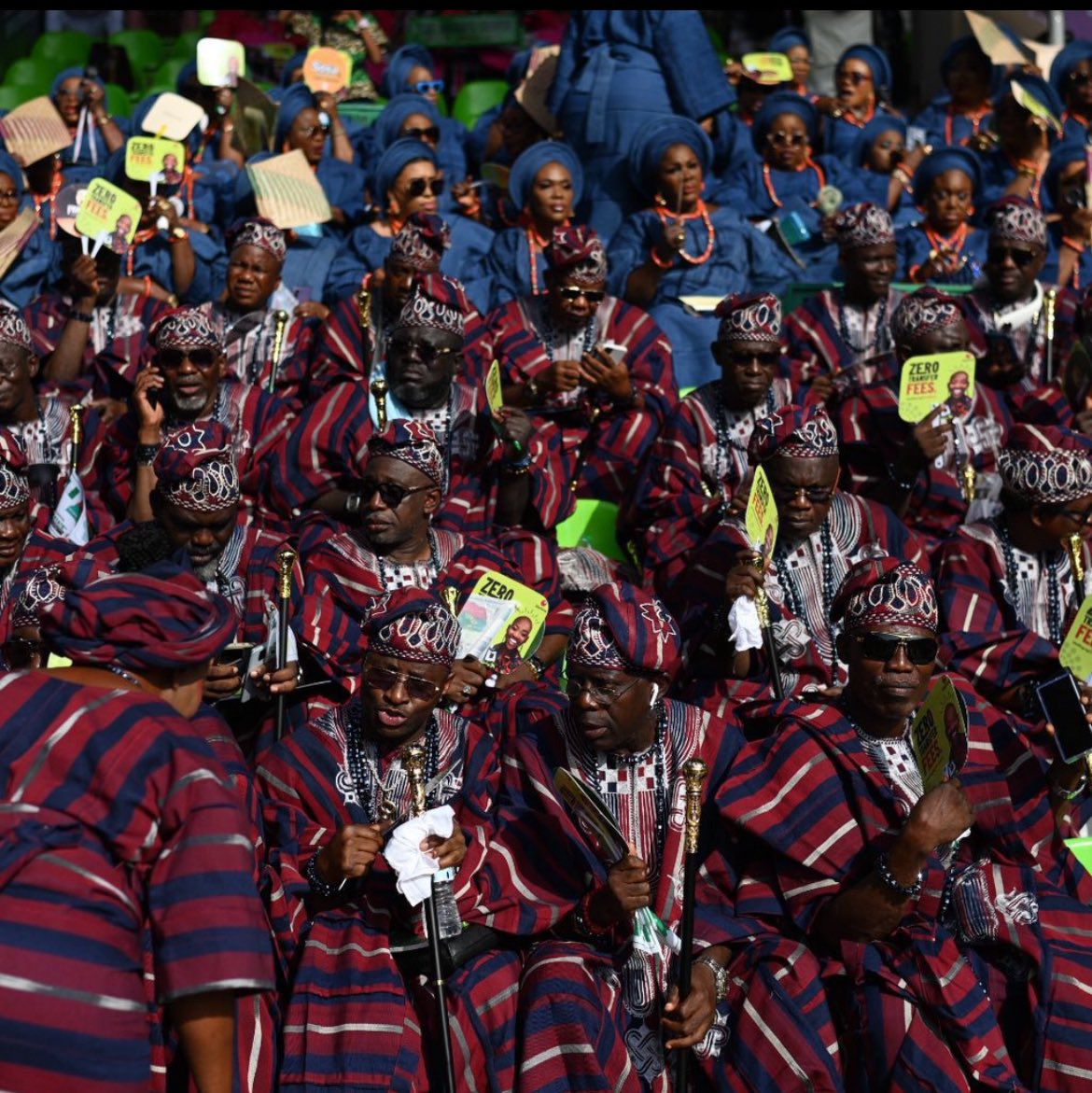
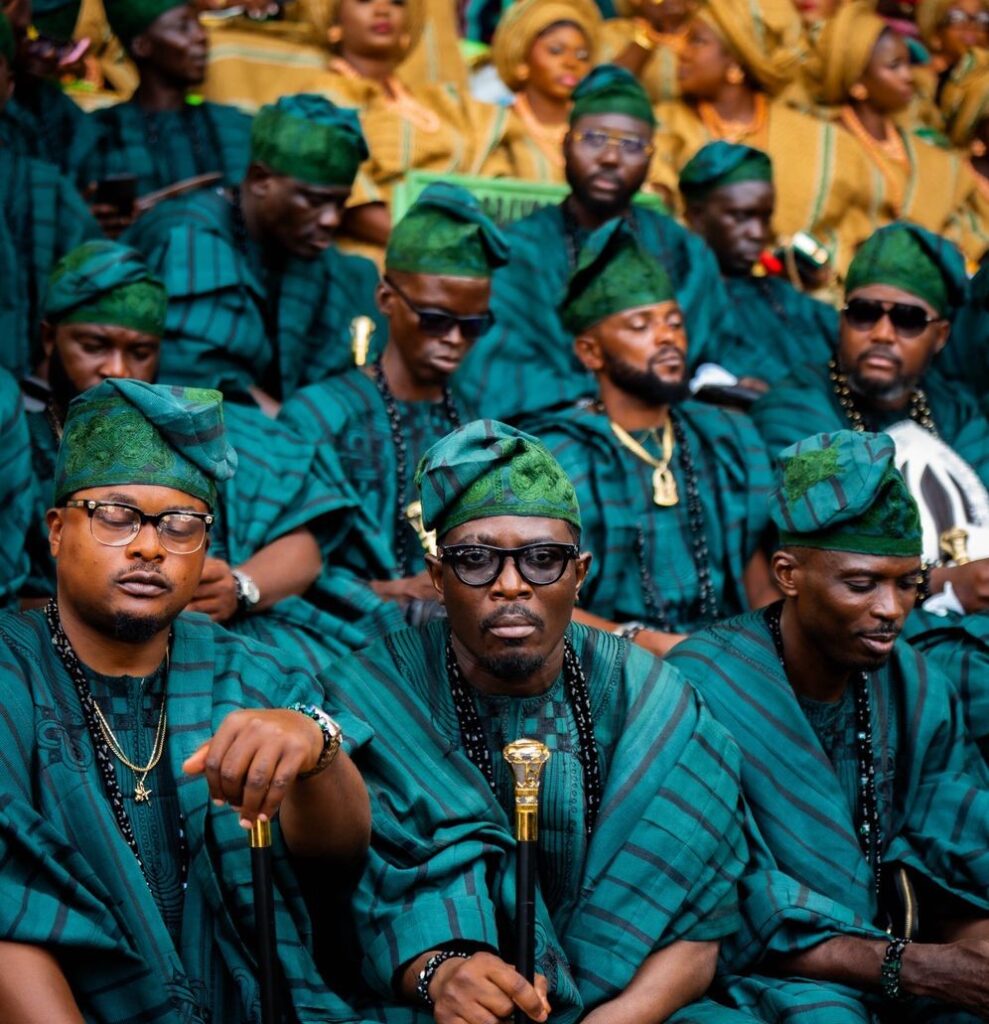
And let’s not even begin to finish this paragraph without truly appreciating the horses. These were not just animals; they were extensions of the fashion narrative, living sculptures draped in custom fabrics, elaborate harnesses, and accessories that were literally works of art. They galloped, pranced, and posed, their beauty mirroring the splendor of their riders. Honestly, Paris Fashion Week might need to dispatch an entire delegation to take copious notes. The innovation, the cultural depth, the sheer audacity of the style at Ojude Oba is unmatched.
The Royal Presence: Awujale in His Element
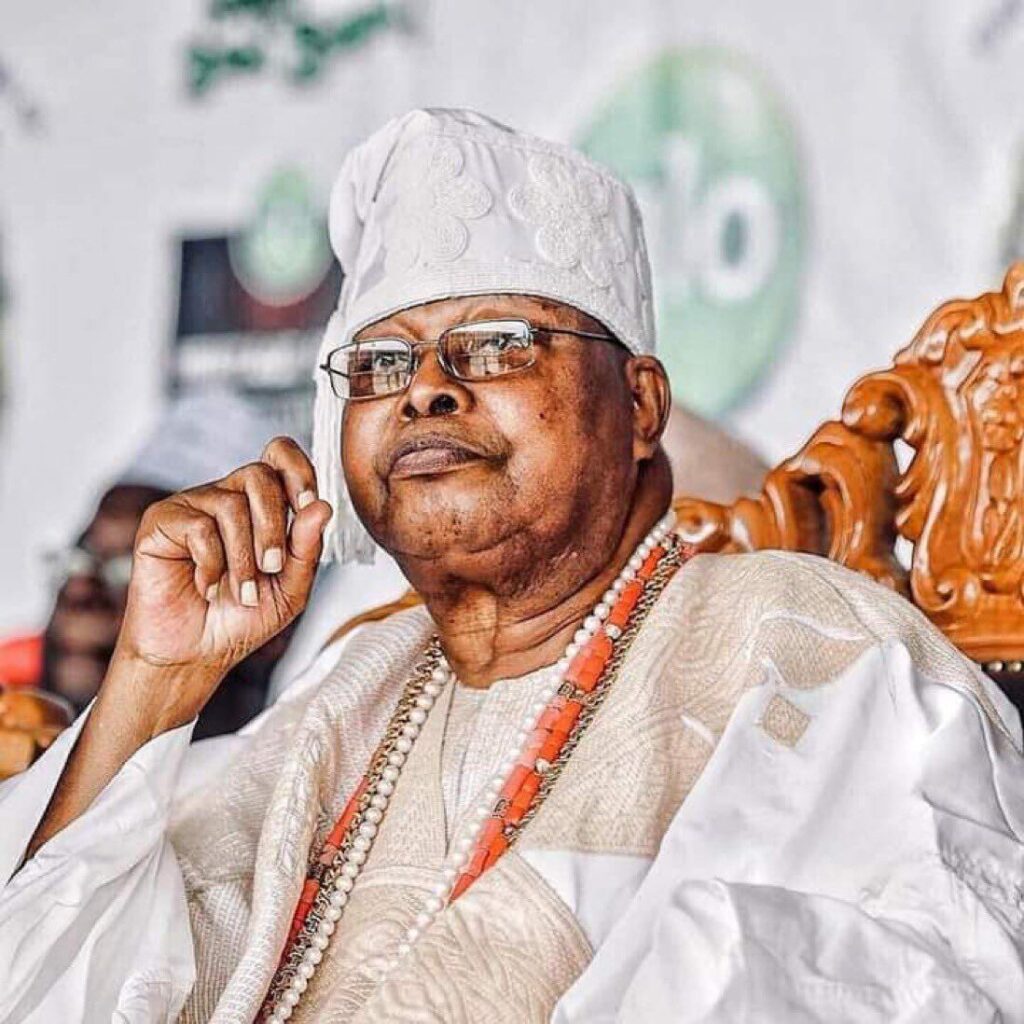
At the magnificent heart of it all is the king himself, His Royal Majesty, Oba Sikiru Kayode Adetona, the revered Awujale of Ijebuland. His presence alone bestows a gravitas that instantly reminds you why this festival exists, why it has endured for so long, and why it holds such profound significance.
Even after decades on the throne, his charisma is utterly unmatched. To witness the streams of people – the Regberegbe, the dignitaries, the countless citizens – bowing, paying homage, and performing in his honor is like watching history unfold in real time. It’s royal, undoubtedly, imbued with the ancient majesty of kingship. Yet, it’s also deeply communal, profoundly personal, akin to a beloved grandfather being honored and celebrated by generations of grateful children and grandchildren. His very presence provides an anchor, a focal point for all the joy and reverence.
A Touch of Politics – But Make It Subtle
Of course, a festival of this magnitude, one that commands such national attention and embodies significant cultural capital, cannot escape the notice of the political class. Many prominent figures indeed showed up, often in full traditional regalia, blending seamlessly into the vibrant spectacle. But here’s the refreshing part: the tone wasn’t heavy with politicking. It wasn’t the usual campaign season energy. Instead, it was respectful, supportive, and overwhelmingly celebratory.
From the First Lady of Lagos, Dr. Ibijoke Sanwo-Olu, to other influential political figures, everyone seemed to understand the assignment: spotlight culture over campaign. Their presence lent weight and endorsement, but it was done with a deference to the festival’s inherent purpose. This delicate balance, where political influence respectfully amplifies cultural heritage rather than overshadows it, was honestly incredibly refreshing and spoke volumes about the festival’s intrinsic power.
Media Frenzy: Ojude Oba Took Over the Internet
This year, Ojude Oba wasn’t just a local celebration; it was a bona fide digital takeover. The festival absolutely dominated social media timelines across every platform imaginable – Instagram, X (formerly Twitter), TikTok, Facebook – everywhere you looked, there were captivating snippets: mesmerizing dances, breathtaking horse parades, exquisite fashion showcases, and sweeping aerial views of the colossal gathering.
Every single post felt like a meticulously curated postcard from a cultural paradise. Major media houses, both national and international, covered it live, providing real-time updates and commentary. Influencers, captivated by the sheer spectacle, created full-day vlogs, sharing their immersive experiences. Even international travel bloggers, often on the hunt for unique global experiences, couldn’t resist dedicating features to “What is Ojude Oba?”, dissecting its traditions and its incredible visual appeal.
And honestly? Even with all that saturation, all that incredible digital coverage, the online experience still didn’t quite do justice to the raw, visceral, overwhelming reality of being there. It’s one thing to watch a video; it’s another to feel the ground vibrate under galloping horses, to hear the roar of the crowd, to breathe in the scents of tradition and festivity.
Tourism, Business, and Economic Boost: Beyond the Glitz
Beyond the dazzling glitz and the palpable energy, Ojude Oba is a powerful economic engine, a massive boon to the local economy of Ijebu-Ode. The impact is staggering and far-reaching.
Hotels within and around Ijebu-Ode are fully booked weeks, sometimes months, in advance. Local tailors and seamstresses work around the clock, their hands flying to meet the immense demand for bespoke traditional outfits. Artisans crafting unique accessories, skilled makeup artists transforming faces, diligent photographers capturing every unforgettable moment, bustling caterers providing sustenance to thousands – virtually every local enterprise sees a significant uplift. The trickle-down effect is immense.
Even the state government is taking notice, and rightly so. There’s a growing recognition of the festival’s potential as a major tourism magnet, leading to increased investment in tourism infrastructure and cultural promotion. Ojude Oba has all the ingredients to become an international tourism powerhouse, much like Brazil’s Carnival or India’s Holi. It’s not just a regional attraction; it’s Nigeria’s cultural gold, shining ever so brightly, ready to be showcased to the world and drive sustainable economic growth.
Security and Coordination? Flawless.
You’d think that with such an immense gathering, thousands upon thousands converging on a single city, chaos would be not just probable but inevitable. Yet, the planning and execution were nothing short of top-notch.
There was a heavy, yet reassuringly calm, presence of security operatives. From meticulous traffic control that ensured smooth flow despite the crowds to expert crowd management that maintained order without stifling the festive spirit, everything was exceptionally well-coordinated. People arrived, celebrated, danced, and departed in peace and safety. This level of flawless execution is a monumental achievement for any event of this scale and speaks volumes about the dedication and planning of the organizers.
Why It Matters – And Why You Should Go Next Year
Ojude Oba isn’t just a festival; it’s a profound reflection of what happens when tradition is not merely preserved but actively celebrated, passionately embraced, and confidently elevated onto the global stage. It’s a powerful reminder that culture doesn’t have to compete with modernity; it can walk right beside it, confidently, beautifully, creating something truly unique and timeless.
So, if you’ve been watching from afar, perhaps scrolling through your feed with a pang of regret, whispering to yourself, “I wish I went,” let this be your definitive sign: mark your calendar for next year. No excuses.
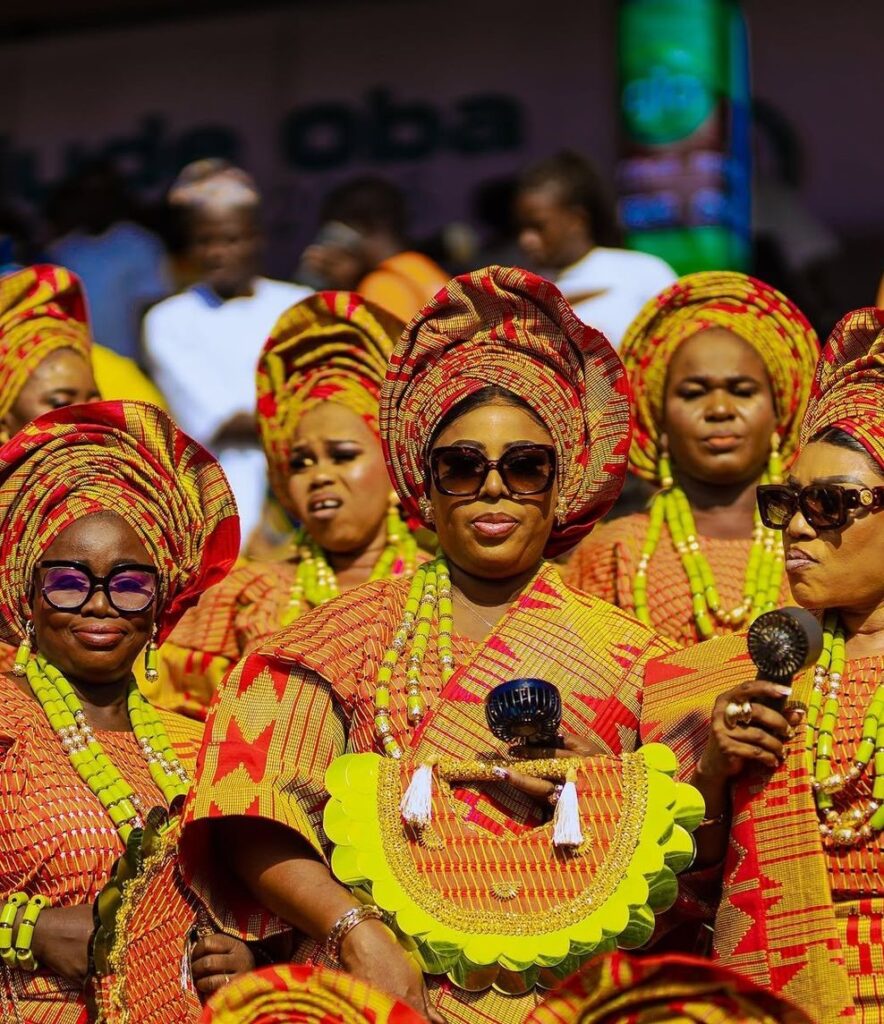
Start planning your outfit now – research those magnificent fabrics, find a tailor who understands the intricate designs. Invite your friends, and make it a group pilgrimage. Most importantly, book your accommodation early, because demand will be fierce.
Because Ojude Oba isn’t just something you hear about or passively observe from a distance; it’s something you feel in your bones, something you experience with every one of your senses. It’s a connection to heritage, a burst of unadulterated joy, and an unforgettable journey into the heart of Ijebu culture. And trust me, once you immerse yourself in its magic, you’ll find yourself coming back, year after year, drawn by its irresistible allure.

